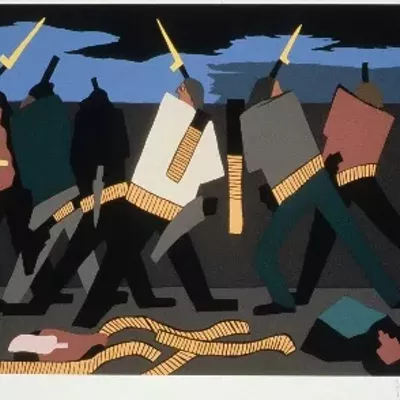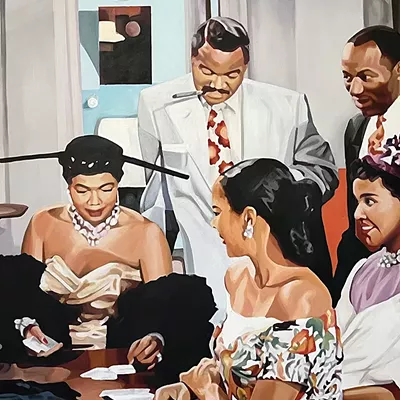Catch a Falling Star catches the Wakelys of Dewey at their wackiest worst and, rarely, at their best. The 1995 comedy by Lee Murphy, now on the boards at Invisible Theatre, is one of those dysfunctional-but-lovable family stories. Everybody in it is a true Texas character, from over-the-top stage mother Virginia Carolina (Maedell Dixon), all big hair and shiny fuchsia shorts, to monosyllabic son-in-law Buzz (Joe Jones), a devotee whose giant Buddha statue graces the driveway outside his trailer.
Jeanne Campbell Baxter, who last acted with IT 10 years ago, plays Ginny, the only Wakely who got away. But only sort of: As the play begins she's on her way back home. The family thinks of Ginny as a big-time Hollywood actress, courtesy of her Doodles dog food ads broadcast nationwide on television; her proud Mama and her little niece Sheree (Rebekah Charles) have committed them to memory. But she's really the falling star of the title. Only her sister Margret-Ann (Suzi List) knows the sleazy truth about her show-biz success. So it's up to Ginny to tell the rest of the family the secret before they read all about it in People magazine.
Trouble is, in a family as noisy as this one, it's hard to get a word in. Mama is so busy telling her favorite daughter how much she loves her that she has no time to listen to her. Plus, she has a pageant and parade to stage. Unbeknownst to Ginny, Virginia has commandeered the whole blessed town to participate in a Ginny Wakely Day.
And--surprise!--beneath the broad surface comedy some truly unfunny things are going on. Margret-Ann has never been anything but second best in her overbearing mother's eyes, and her secondary status hurts. It's given her a sharp tongue and an even sharper eye for life's disparities, and it just may be the reason she's been packing on the pounds and losing her grip on her marriage. Dad Darryl, played by James Blair, is a drunk, and despite having dedicated himself to the Lord a mere two weeks ago, he's never without a pint in his pocket. Virginia and Darryl snipe at each other all the time, and he gets even by whacking golf balls against the house. Most of the time, though, he's too wasted to clue into all the females fluttering around him.
In fact, both the play's male actors turn into curious ciphers. Blair, who also designed the low-rent house set, is a talented IT veteran, but here he's never more than wooden. Newcomer Jones, playing Buzz, has impressive credits with the Royal Shakespeare Company and the BBC, but in his first outing in Tucson he's almost invisible--apart from the long hair and beard that get him mistaken for Christ.
The women, by contrast, revel in over-the-top parts. List, another familiar Tucson face, is a stitch as the wisecracking Margret-Ann, and she's good-naturedly worn an unflattering outfit engineered to make her look like a Texas blimp. She's funny and touching as the neglected daughter who not so incidentally is the one who's stayed around to look after Mom and Dad. Campbell is lovely as the vulnerable Ginny: She twists her face into an array of smiles that are docile and terrified at the same time, and she's a natural at aping the cold white flesh and sweats of fear-induced nausea. Dixon, an Equity actor who's just returned from playing Off Broadway, does her best as the screeching Virgina, but author Murphy has made this paragon of passive aggression just a tad too one-note.
Director Gail Fitzhugh plays this material for conventional laughs as the playwright intended, even a scene where a drunken Darryl up and punches one of his daughters in the face. Why the playwright finds this troubled bunch so funny is a bit of a mystery. Part of her humor is unattractively classist: The play sneers down its nose at the kind of people who routinely invoke Jesus and know their way around a trailer park. And alcoholism and violence are not really a big har-har either. Murphy tries to redeem the disorder with a heartwarming message that love beats steadily beneath the Wakely dysfunction, but she's hardly persuasive.
The show can be fun--it's full of rollicking one-liners, and the opening-night audience didn't have to be cajoled into singing the title song along with the characters. But the disconnect between the sordid subject and the humor makes this Star more tarnished than shining.











